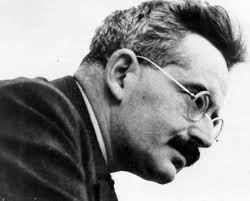 |
| Walter Benjamin |
Benjamin left Germany in 1932. After moving around a bit he eventually ended up in Paris in self-induced exile because as a jew, an intellectual, and a leftist, he knew that he couldn't co back to Germany. During his time in Paris he laboured on his most remarkable work entitled The Arcades Project, a huge tome of theoretical and literary snippets on every subject from Baudelaire to Surrealism.
Benjamin was finally forced to flee Paris in June of 1940 as the Panzers descended on the Capital. He had left his unfinished manuscript of The Arcades Project with another remarkable intellectual, Georges Bataille. Benjamin managed to leave only a day before the Nazi's arrived with orders for his arrest. Benjamin was planning to get to American via Spain and then Portugal. He made it across the French-Spanish border but the Franco government had suddenly cut off the Portuguese frontier to refugees. There were rumours that the Spanish police were going to arrest Benjamin, along with numerous other refugees that he was with, and deport them back to France, where he would certainly have fallen into the hands of the Nazis. To avoid that terrible fate, Benjamin took a fatal overdose of morphine on the 25th of September 1940, he was forty-eight years old. Considering the remarkable power and acuity of his work during his 30s and 40s, we can assume that had he lived, he would have been one of the greatest literary and aesthetic theorists of all time.
During the pre-war and interwar years Western nations took in many refugees. Some of these were or turned out to be important intellectuals, artists, and scientists. Others were just average people who wanted to live their lives, in as happy and peaceful surroundings that they could. Unfortunately, some refugees were turned away or prevented from leaving and payed with their lives. Perhaps the most famous of those that were turned away were the 900 on board the Ocean Liner MS St. Louis who were turned away from Cuba, The United States, and Canada, despite the authorities knowing full well what was going on in Germany and what their fate might be. Many of the passengers on the MS St. Louis eventually died in concentrations camps, a sad and inconvenient truth we would do well to remember today. Whenever I hear about the refugee crisis in the Middle-East and Europe I think about Walter Benjamin. This is not because I put more value in intellectuals than other people. Rather, I think about Benjamin because it reminds me of the lives that potentially go unfulfilled, the promise of life that all those people fleeing war are hoping to enjoy, but might not be able to. I think about all those people who could, in a million different ways, make a contribution to our lives, to my life, if only our elected officials would make an effort to act as swiftly as possible.
Little Alyn Kurdi, the boy who we all saw dead on a Turkish beach a little more than a week ago, might have gone on to cure cancer, or he might have gone on to be a school teacher, or perhaps a humble tradesman. But whatever he might have gone on to do with his life, he would have laughed and cried, sang and danced, loved and lost, and enriched the lives of those around him. When we think of the refugees fleeing war today, I hope we don't think in the abstract. I hope we think of real, concrete human beings who don't just deserve to live decent lives but who we deserve to have among us because they can make us better, more fulfilled people.
No comments:
Post a Comment